1. Introduction
In October 2021 hardly anybody in the academic sphere or in the business world would claim that they are not concerned with climate change. Writing at the end of October 2021, three months after the IPCC report Code Red for Humanity and a few days before COP 26, the United Nations Climate Change Conference in Glasgow, things look rather gloomy. To take only one example, considering that the building and construction sector is responsible for 39% of greenhouse gas emissions (World Green Building Council, 2021) and that the sector is dangerously off-track regarding decarbonization, it already sheds doubt on COP 26’s ambitious goals. A lot of climate diplomacy is being played out in the media and even more behind its back, not all of it successful. On the contrary, the window of opportunity to avoid planetary disasters seems to be closing fast. In the European context. one of the leading academic pessimists is Jem Bendel of North Cumbria University in the UK. His Deep Adaptation paper, published online after many scientific journals had refused to publish it, has been downloaded by millions and gathered thousands of followers among scholars, highly positioned executives in the private and public sectors. He has also gained support from hundreds of thousands, if not millions, of young people as a result of being closely connected to the Extinction Rebellion movement. The number of his followers among academia and business executives grows day by day with his call for introspection based on questions with no answers and the difficult choices to be made. He asks is it really too late. His answer is that there is a strong possibility that it is. What then? How are we going to live? His introspective journey in the face of climate change-related social collapse makes for scary reading for a teacher that has to decide how far to go in trying to impact the awareness of students in some positive and optimistic directions.
How did we reach this point when scientists have been warning for decades that climate collapse is bound to happen? Greed, profit-oriented business, greenwashing, lack of governmental control, the refusal of some of the largest polluting states to agree to cut down emissions, are some of the answers.
A dilemma that teachers of future business leaders are bound to face is how to understand current levels of awareness of students and their potential to act. The research reported on here began as action research but is likely to continue as part of a bigger research project in the future through the creation of a platform to engage with students and teachers sharing the same burden of climate change pressure in education. Students of today will live most of their lives in that insecure and threatening future that we have been creating for them. The least we can do is to try to prepare them for it.
2. Desk Research: Western dominations
Research on climate change awareness has, for a long time, been dominated by studies in the so-called Western world (the USA, Western Europe, Australia, etc.) and not much is clear, yet, about factors that change citizens` levels and type of awareness of climate change, including students. Research from more than five years ago suggests that, in the US, the most important predictors of climate change awareness are civic engagement, communication access, and education, while, in China, key predictors are education, geographical location, and household income (Lee et al, 2015). Education, it turns out, is a predictor regardless of the social, economic, and political context.
The lack of curriculum content on climate change awareness has been a motivating factor for several research studies of students’ attitudes with a focus, mainly, on primary and secondary school children, since, according to age-stability theory, adolescents` social and political attitudes are already strongly developed by the time they leave secondary school (Alwin & Krosnick, 1991; Sears & Funk, 1999). In the past decade, several research studies were conducted investigating the attitudes of students towards climate change with the aim to reveal the potential capacity for social change. One of the many instruments introduced was the Climate Change Attitude Survey (CCAS) developed by Christensen and Knezek in 2015 because of the lack of valid instruments to measure the affective response of middle school students. (Christensen & Knezek, 2015). To validate the instrument, they gathered data from 1,576 middle school students from across the US expecting it would help educators to assess the pre-and post-intervention attitudes of students. Their analysis indicated the reliability of the Climate Change Attitude Survey and showed that student respondents in most cases were positive about climate change indeed happening (belief) and were generally positive about their ability to make an impact on climate change (intention). Variations of this survey focusing on attitudes and belief in the ability to have an impact have since then been used in several recent studies. However, as it has been logically assumed that “belief” in climate change really happening is not an issue anymore, at least not on any wider scale, the focus has shifted to self-confidence regarding students’ own potential to impact the social change needed. The main concern is now on assessing their degree of optimism or scepticism regarding the potential will of decision-makers to initiate and sustain change and their own abilities to impact these decisions.
Motivation is always the most important factor. Brick et. al., in a review on motivation and climate change, claim that environmentalism is not the main cause of what people think about climate change and how they behave towards it, but some social needs are. So, they advise not to apply interventions that attempt to create environmental beliefs and related identities but to target Belongingness, Understanding, Control, Self-Enhancement, and Trust (named by them the BUCKET model), which concentrates on strengthening existing motives (Brick et al. 2021). Belonging is about social norms; feelings shaped by the desire to build and sustain positive social relationships. It is generally underestimated how much people`s behavior is influenced by others. This resembles the type of communication used in messages based on nudge theory, a very popular approach, particularly in pandemic times. Understanding is related to this, as people care very much about understanding what is going on and do not want to be the victims of various conspiracy theories, because they need the satisfaction of understanding. Thus, delivering messages based on understandable scientific consensus would also affect their behavior. Controlling is about being competitive and effective as people often feel that their own actions will not change anything and that the problem is overwhelming, leaving them powerless. Thus, translating the need to change behavior into less distant and doable action has proven to be more efficient. Self-Enhancing is about people being motivated by a self-image of consistency and worthiness. An increasing number of consumers express their self-identity through purchase decisions that are evidence of climate change-related attitudes. Thus, climate change is a moral issue for many people and needs to be included in communication messages. Finally, regarding Trust, people are motivated to trust others and believe they are benevolent which opens the door to policy support to mitigation (Brick et al., 2021).
The relation between awareness of environmental and climate change amongst students and their attitudes about the importance of corporate social responsibility (CSR) and responsible management education as stipulated in the UN Principles for Responsible Management Education (UNPRME) has been one of the aims of an ongoing biennial survey of students` attitudes conducted by PRME and Macquarie University. The last available survey, published in 2018, shows that assessed commitment to CSR is strong as is awareness about the 17 Sustainable Development Goals. In fact, awareness nearly doubled in only two years since the previous research survey. The topic of this research was not climate change but the state of corporate social responsibility and responsible management education, but six out of seven segments of the survey all dealt, if only partially, with student climate change awareness, and current and future behavior. The results show a growing concern among students about environmental sustainability and the future of the planet. (Haski-Leventhal & Manefield, 2018), The survey received 879 responses from students enrolled in tertiary academic institutions who were signatories to PRME, residing in forty countries across six continents. In specific questions on environmental sustainability, 81 percent agreed or strongly agreed that companies could do more for the environment and society. The survey’s conclusion was that there has been a rise in the importance assigned to the environment and sustainability, thus sending a valuable message to business schools, corporations, and policymakers. ( Haski-Leventhal & Manefield, 2018).
PRME, by now a rather institutionalized initiative of the United Nations, has a strong role to play. It builds directly on the UN Global Compact (UNGC) launched back in 2000 by then UN Secretary-general Kofi Annan who had the vision to unite global business leaders through a platform of corporate social responsibility by committing, on behalf of their companies, to ten basic principles of conducting business in an ethical and responsible manner taking into account the interests of all stakeholders. UNGC now counts more than 12,000 signatories in 160 countries representing nearly every sector and size of business. It is defined as “a voluntary initiative based on CEO commitments to implement universal sustainability principles and to take steps to support UN goals” (www.unglobalompact.org, 2021).
UNPRME was developed in 2007 by an international task force of sixty academic deans, university presidents, and official representatives of leading business schools and academic institutions. It defines itself as “a global movement transforming business and management education through research and leadership” (UNPRME, 2021). It is a free initiative of higher education institutions committed to six basic principles of responsible management education that currently has over 800 signatories in universities all over the world. (UNPRME, 2021). The initiative, being also part of a wider sustainable business global network, has an important role in the education of future business leaders and its introduction has proved instrumental in raising awareness about climate change in universities.
Climate change 2021, Summary for policymakers (SPMM), provides a high-level summary of the understanding of the current state of the climate, providing climate information relevant to specific regions and sectors, and limiting human-induced climate change. (Climate Change 2021). Over the 39 pages of the report, evidence is given of global warming and other elements of the ongoing processes that are likely to change the planet. In October 2021, media were focused on the Glasgow United Nations Conference on Climate Change which is considered to be a decisive turning point.
Climate change pressure is in people`s minds increasingly connected to the ongoing and resilient pandemic. To assess how the experience of lockdown impacted perceptions of the future, albeit, on a limited sample (950 people from 58 different countries across the world), Briggs (2020) suggested that the social impact of the pandemic provoked self-reflection and some forms of re-evaluation of people’s professional and private lives, students included. There seems to be a consensus within this heterogeneous and limited sample of various ages, that the future is, for certain, going to be radically different.
3. Methodology: beyond action research
As a researcher teaching Business Ethics and Corporate Social Responsibility (CSR) and practicing it in the corporate world, an interest in the role of business in sustainable social development and environmental protection is logical.
While action research is often underestimated as the lowest on the research pyramid of academic “worth”, academics are often prompted by issues emerging from practice, and vice versa. Teachers carry huge responsibility and often engage in action research which is usually defined as an inquiry process in which researchers integrate their knowledge of applied behavioral science with existing organizational knowledge to solve problems (Coghlan & Brannick, 2005).
Action research is often conducted in a cyclical manner, depending on interventions planned and executed, on the results of interventions, and the results of new research based on new research questions. This often means that action research can be a prolonged endeavor, extending over several cycles of interventions and evidence. The research reported upon here is just one phase of what is likely to become a long series of inquiries about students’ awareness of climate change.
The students included in the research had not received any teaching sessions by this teacher on climate change prior to this survey. Environmental issues are foreseen in the syllabus in the second half of the semester. Before being included in this survey, they had been exposed only to a general introduction to business ethics, the foundations of ethical thought, a stakeholder approach to business, and broad definitions of CSR. Within the course, students are, as a rule, encouraged to openly express their opinions and attitudes.
The research questions in this phase focus on three basic issues related to student awareness, capacity for change, and teachers` role.
RQ1: Which attitudes and emotions are shared by the students?
RQ2: What are students’ capacities to behave and act in line with their attitudes?
RQ3: What are the school`s roles and responsibilities in this respect?
Corresponding hypotheses are as follows:
H1: Students are concerned and worried about climate change.
H2: Students want to act but lack knowledge and adequate support.
H3: There is an area for improvement in the activities of business schools in terms of awareness-raising and capacity building of students regarding their roles in climate change-related social actions.
In this first phase, a triangulated qualitative and quantitative methodology was used with a sample of 116 students enrolled in three sections of the course Business Ethics and Corporate Social Responsibility in the academic year 2021/22. The survey and a focus group (eight students) were conducted in September and October 2021 while monitoring, teacher observation, and analysis of student discussion in a Discussion Forum on the MyCourses platform have been an ongoing activity.
4. Results and Discussion
Out of 116 students who anonymously answered the fifteen questions in the questionnaire entitled Climate Change of Students, 61(52.6 %) were male and 55 (48.3%) were female. Out of the total number, 100 (86.2%) were students from Croatia, 13 (11.2 %) were from the United States, two were Albanians, two French students, and there was one student per country from the following countries: Belgium, Germany, Pakistan, South Africa, Slovenia, Bosnia and Herzegovina, Chile. All were undergraduates; 103 (88.6%) were enrolled in the International Business program (IB) while the remaining 13 (11.2%) were enrolled in the Information technology program (IT). The majority of students were of some type of high school background. (Figure 1)
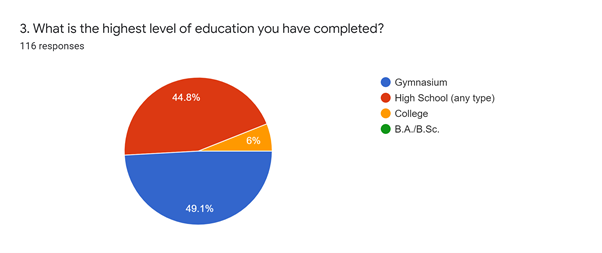
Figure 1. Previous education
Only 7 (6.0%) were freshmen (1st year), there were 18 (16.4%) seniors (4th year), 15 (13.8%) sophomores (2nd year), and the majority, 74 (63.8%) were juniors (3rd year). (Figure 2)
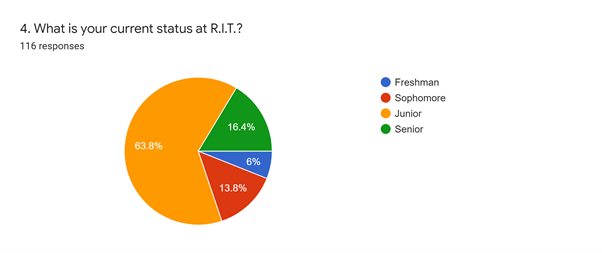
Figure 2. Current status at the business school
There were two questions about global warming aiming to measure students’ beliefs about global warming. The majority stated that human interventions caused global warming and related climate changes, and this finding does not differ significantly from the other mentioned previous global research. (Figure 3)
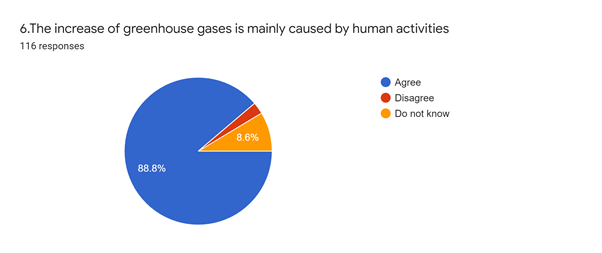
Figure 3. Human activities causing greenhouse gases to increase
When asked about natural causes of climate change, as expected, most students also disagreed that these would be caused by natural variations. (Figure 4)
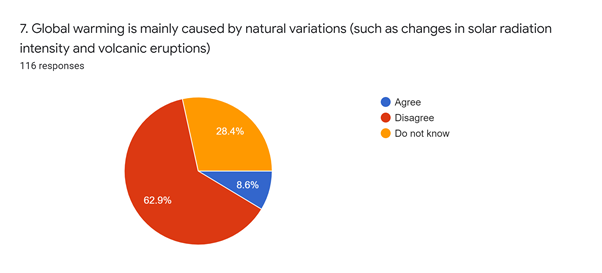
Figure 4. Beliefs about global warming and natural variations
The next five questions addressed students` concerns about global warming and their readiness to act. The overwhelming majority of students (88.8%) are much very much or somewhat worried about the consequences of global warming on their future lives which corresponds to the results of other research suggesting that this awareness has risen in the last decade as climate change awareness of the general population has risen too. (Figure 5)
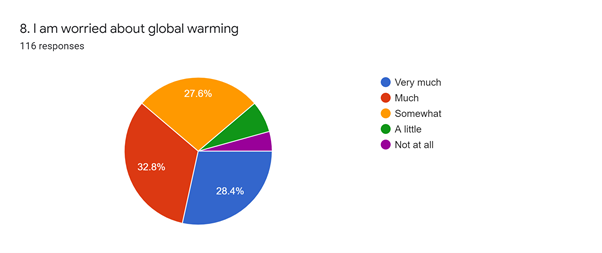
Figure 5. Concern about climate change
As one student put it eloquently in the focus group discussion:
Of course, I am worried, who wouldn’t be, it already looks scary, I am afraid to think what will happen in ten years from now. I used to think of life in simple terms: college, degree, job, marriage, children. I still do, but often, I start thinking I cannot plan that as it is not possible to plan because of what is happening to the climate.
The next questions assessed students’ willingness to take matters into their own hands. While the question about willingness to make specific personal efforts in the framework of their regular life does not specify what those efforts would be (Figure 6), the discussion in discussion fora and in the focus group produced a list of activities that focus on green consumption, awareness-raising among peers and parents, general behavior in terms of transport, waste management, and so on.
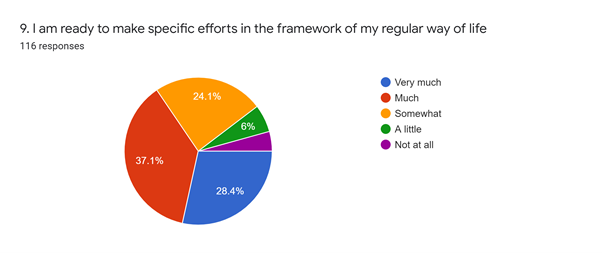
Figure 6. Readiness to make specific efforts
Specific efforts might have seemed easier for them than the change of life which could seem a more challenging concept. Nevertheless, 84.5% express readiness to change their lives to make their contribution to climate change control. (Figure 7)
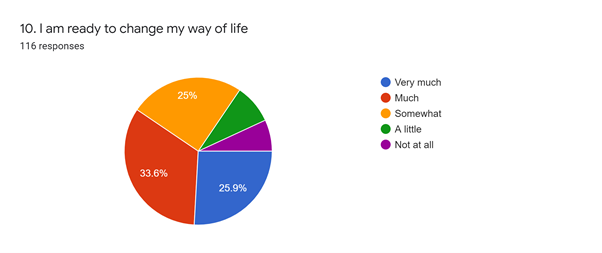
Figure 7. Readiness to change the way of life
Students’ ability to engage in change would also depend on their capacity and willingness to learn. Answering the question about willingness to learn, 70.7% are ready to learn much or very much more, and an additional 26.7 % are ready to learn somewhat or a little. (Figure 8)
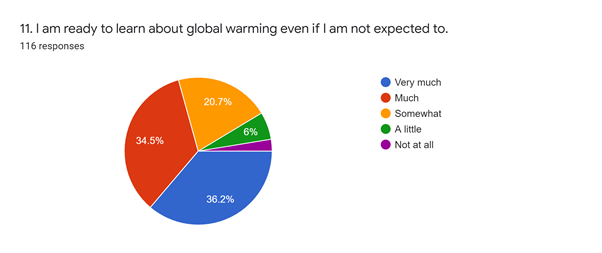
Figure 8. Willingness to learn
Students show not only the willingness to learn but also demonstrate readiness to influence other students, family members, and friends so that these results are also in line with the indicated engagement willingness that is the subject of RQ 2 and the related hypothesis. (Figure 9)
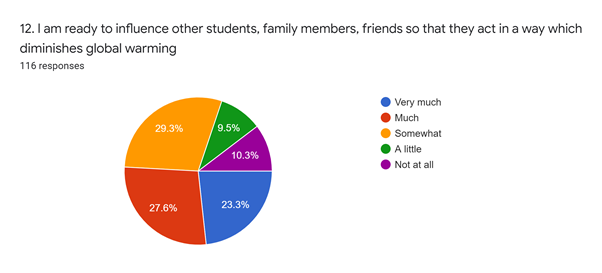
Figure 9. Willingness to influence others
However, when asked specifically in the focus group, some students expressed doubts about, and even resentment of, voluntary citizen action compared to the meaningful engagement of decision-makers. Some expressed feelings of being powerless, including one of the participants in the focus group who stated:
What difference can I make? OK, I can recycle and all that, but this is not enough. Governments are not doing what they should. Also, some countries like China, for example, would not stop polluting and causing global warming. How could I make a difference?
One of two open questions dealt with the concept of Deep Adaptation based on the view that humanity needs to prepare for the possibility of societal collapse, as environmental change increasingly disrupts social, economic, and political systems. Unlike climate change adaptation, which aims to adapt societies gradually to the effects of climate change, Deep Adaptation is premised on an acceptance of impending abrupt transformations of the environment and related social system.
One of two open questions dealt with the concept of Deep Adaptation based on the view that humanity needs to prepare for the possibility of societal collapse, as environmental change increasingly disrupts social, economic, and political systems. Unlike climate change adaptation, which aims to adapt societies gradually to the effects of climate change, Deep Adaptation is premised on an acceptance of impending abrupt transformations of the environment and related social system. Students were prompted to describe their reaction to this concept in a few sentences.
The answers displayed a spectrum of reactions from very negative to very positive, as illustrated by the two answers quoted here:
I think this is ridiculous. We should not be preparing for dying, we should be trying to stop it from happening. I am not sure if the people involved in Deep Adaptation realize that if we are to fail in minimizing the effects of global warming, there will be no environment in which we can survive in the long term. Therefore, there will be no social, economic, and political systems that need adapting to the changes. If our technology were better, there might be some possibilities, but right now I do not believe in this possibility.
I like this concept of Deep Adaptation. I think that people won't accept the truth until some harsh changes are made.
There were, approximately, one-third positive, one-third negative reactions, and one-third answers that showed that students did not fully understand the concept. As none of the previous research noted here has investigated the impact of the concept of Deep Adaptation on students, it clearly needs more in-depth investigation.
Two questions addressed the role of business schools in assisting students to cope with the consequences of climate change and changing their behavior. A quarter of participating students felt they were not receiving enough information, which could be a matter of concern. In answers to the question about potential improvements students proposed various interventions in the current curriculum and school practices, from integration in various courses, guest lectures, hosting events, “green campus”, “walking the talk”, teacher engagement, essays, group research to practice work and volunteering. Analysis of these answers as well as a discussion in the focus group illustrates a prevailing opinion of the need for positive and increased engagement of teachers in building the awareness of students, or, as one student wrote about their expectations from teachers:
By making us realize that's not too late to change!
5. Conclusions and Recommendations
Many previous research studies have suggested a whole range of attitudes and reactions on personal and collective levels with not many clear indications of the role of the teaching process. Apart from courses that are dealing directly with environmental issues or business ethics, the impression is that there is a silo culture in many higher education institutions where teachers are not treating the climate change perspective as integrated into all courses.
The research questions discussed here focused on identifying students` attitudes and willingness to act and on the role of schools and teachers. Three hypotheses (Students are concerned; Students want to act but lack the knowledge and adequate support; Business schools could more in this respect) were confirmed. The research was primarily an action research study that has, therefore, related limitations regarding the small sample size (100+ students from one course in one business school). It does, however, provide an indication for future research. The role of the cultural context and students’ first-hand experience as opposed to distant social media-based reflection on the issue is another point of interest, important in indicating what elements in awareness programs for students should be studied, piloted, introduced, and evaluated. A sincere and profound analysis of existing curricula and current practices would, in this sense, be recommended next steps in schools that address student education in the context of full corporate social responsibility and responsible management education.
6. References
Alwin, D.F., & Krosnick, J.A., (1991) Aging, cohorts, and the stability of socio-political orientations over the life span, American Journal of Sociology
Brick, S., Bosshard, A.,Whitmarch, Motivation and Climate Change: A Review, Current Opinion in Psychology 2021, 42: 82-88
Briggs, D. (2020) Coronavirus: The Beginning of a New End? Journal of Global Resources, Volume 6(01a), Special Issue, June 2020, (1-9)
Bouman, T., Verschoor, M., Albers, C. J., Böhm, G., Fisher, S. D., Poortinga, W., Whitmarsh, L., & Steg, L. (2020). When worry about climate change leads to climate action: How values, worry and personal responsibility relate to various climate actions. Global Environmental Change, 62, [102061]. https://doi.org/10.1016/j.gloenvcha.2020.102061
Conghlan, B., Brannick, T. (2005), Doing Action Research in your own Organization, SAGE Publications Ltd.
Christensen, R., & Knezek, G., (2015), The Climate Change Attitude Survey: Measuring Middle School Student Beliefs and Intentions to Enact Positive Environmental Change, International Journal of Environmental & Science Education, 2015 10(5), 773-788
Haski-Leventhal D., & Manefield, S. (2018), PRME & MSGM, The State of CSR and RME in Business Schools: The Students` Voice, Fourth Biennial Survey https://d30mzt1bxg5llt.cloudfront.net/public/uploads/PDFs/PRMESurvey2018FINAL.pdf
Intergovernmental panel on climate change, IPCC (2021),Climate Change 2021, The Physical Science Basis, Summary for Policy Makers (https://www.ipcc.ch/report/ar6/wg1/)
Lee, T.M, Markowitz, E.M., Howe, P.D., Ko,C-Y, Leiserowutz, A.A. (2015) Predictors of Public Climate Change Awareness and Risk Perception around the World. Nature Climate Change, Volume 5, published online, 27 July 2015
Principles for Responsible Management Education – PRME; www.unprme.org
UN Global Compact, 2021, www.unglobalcompact.org
Un Sustainable Development Goals, 2021, www.sdgs.un.org/goals
World Green Building Council (2021), https://www.worldgbc.org/news-media/WorldGBC-embodied-carbon-report-published#:~:text=Together%2C%20building%20and%20construction%20are,buildings)%20accounting%20for%2028%25
